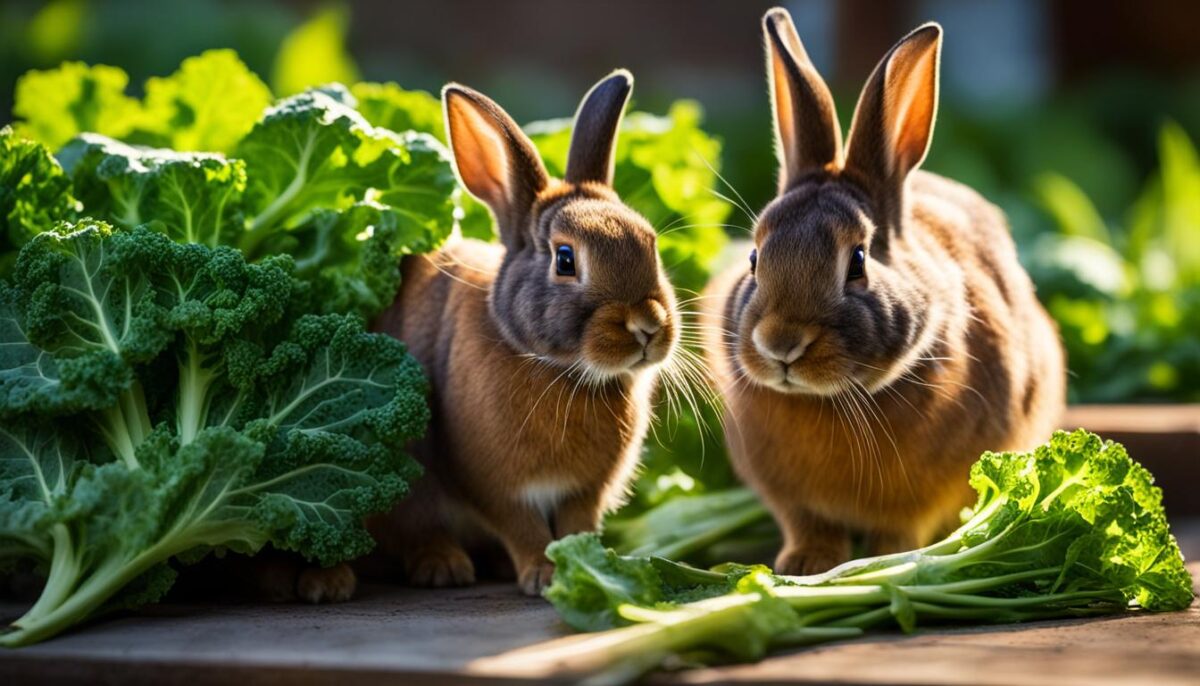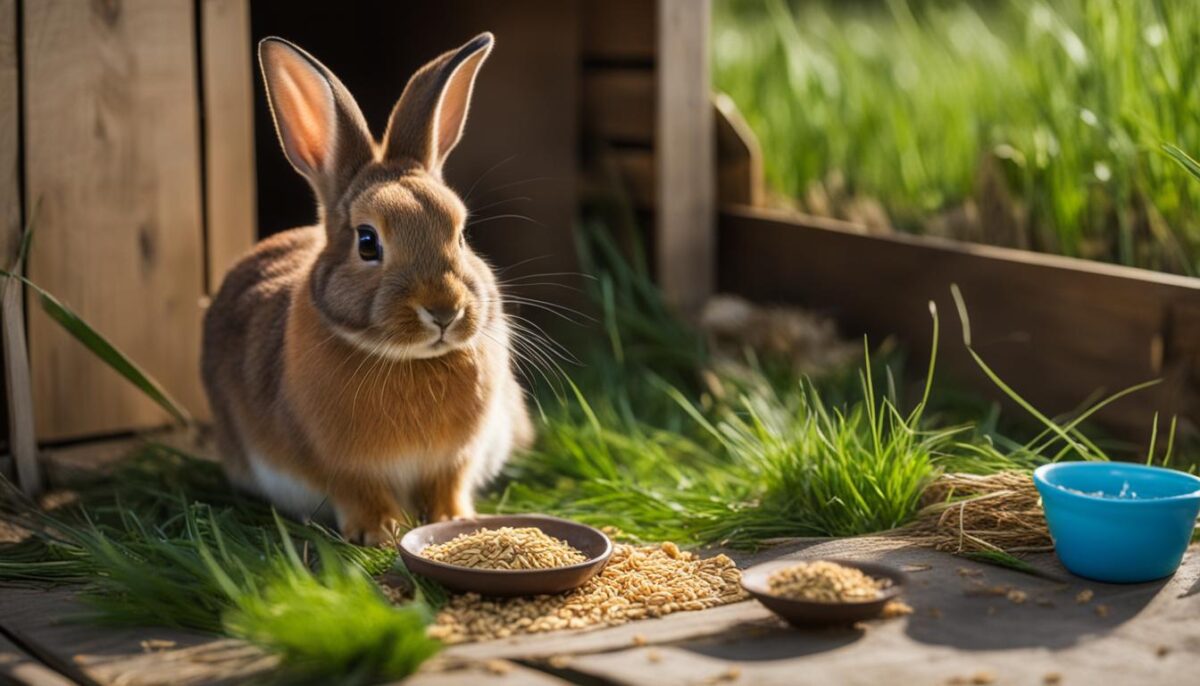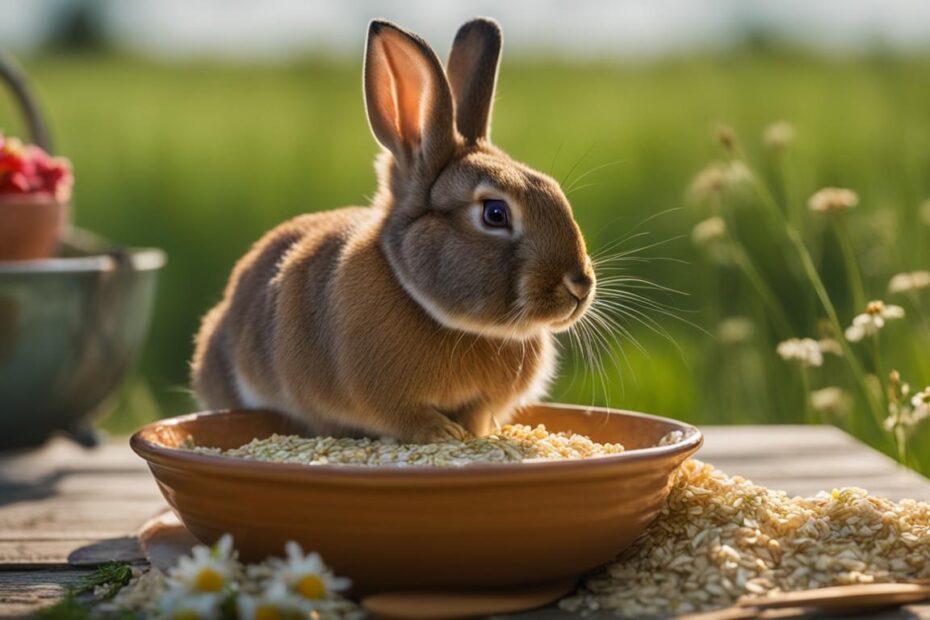Rabbits require a balanced diet to maintain good health. They are herbivores and primarily eat plants, such as hay, greens, and pellets. Treats should only make up a small portion of their diet. Hay should make up about 85% of a rabbit’s diet and is essential for their digestion and dental health. Timothy hay is generally the best hay for rabbits, but alternatives, such as orchard grass and oat hay, can be used as well. Greens, like lettuce, escarole, and parsley, should make up about 10% of a rabbit’s diet. Pellets should only make up about 5% or less of their diet and should be low in fat and have a high fiber content. It is important to feed rabbits a balanced diet to ensure they have a long and healthy life.
Key Takeaways:
- Rabbits should have a balanced diet consisting primarily of hay, greens, and pellets.
- Hay should make up about 85% of a rabbit’s diet and is crucial for digestion and dental health.
- Timothy hay is generally the best hay for rabbits.
- Greens should make up about 10% of a rabbit’s diet and provide essential vitamins and minerals.
- Pellets should only make up about 5% or less of a rabbit’s diet and should be low in fat and high in fiber.
The Benefits of Hay in a Rabbit’s Diet
Hay plays a crucial role in a rabbit’s diet, providing numerous benefits for their overall health and well-being. It is an essential source of fiber, aiding in proper digestion and preventing gastrointestinal issues. Additionally, hay helps to maintain the dental health of rabbits by promoting natural chewing and wearing down their teeth.
Timothy hay is considered the best type of hay for rabbits, as it is softer and contains fewer seed heads than other varieties. However, alternative hays such as orchard grass, meadow grass, brome, and mountain grass can also be used. It is important to offer rabbits unlimited access to hay, making it the primary component of their diet. Aim for at least 85% of their daily food intake to consist of hay.
Hay provides essential nutrients and aids in proper digestion, making it a crucial part of a rabbit’s diet. Additionally, it helps to prevent dental problems by keeping their teeth in good condition. Make sure to choose high-quality, fresh hay for your rabbit and provide it in abundance to support their optimal health.
Table: Comparing Types of Hay for Rabbits
| Type of Hay | Advantages | Disadvantages |
|---|---|---|
| Timothy Hay | Soft texture, low seed heads | Relatively expensive |
| Orchard Grass | Rich in fiber and nutrients | May contain more seed heads |
| Meadow Grass | Varied textures and flavors | Can be harder to find |
| Brome | High in fiber, nutritious | Less widely available |
| Mountain Grass | Provides foraging experience | Potentially higher cost |
Table: Comparing Types of Hay for Rabbits
The Role of Greens in a Rabbit’s Diet
Rabbits have a natural need for greens in their diet as they provide essential vitamins and minerals. Greens should make up about 10% of a rabbit’s overall diet to ensure their nutritional needs are met. However, it is important to introduce greens slowly to avoid any digestive upset. Some greens have a higher calcium content, which may contribute to bladder stone formation in rabbits. Therefore, it is recommended to feed these greens in moderation.
Safe greens for rabbits include green leaf lettuce, red leaf lettuce, romaine lettuce, boston lettuce, and parsley. These greens are low in calcium and can be fed in larger quantities without causing any harm. It is crucial to remember that while greens are beneficial, they should not be the main component of a rabbit’s diet. Hay should still make up the majority of their food intake, followed by pellets.
To provide a balanced diet, it is important to offer a variety of greens to rabbits. This can include a mixture of different lettuces, as well as other safe vegetables like dandelion greens, cilantro, and carrot tops. Variety in a rabbit’s diet helps ensure they receive a wide range of nutrients. Always wash greens thoroughly before feeding them to rabbits to remove any pesticides or dirt that may be present.
The Importance of Calcium Balance
While greens are an important part of a rabbit’s diet, it’s crucial to take into consideration the calcium content in certain greens. Leafy greens like kale and spinach are high in calcium, and a diet too high in calcium can lead to health issues such as bladder stones in rabbits. Calcium balance is essential, and it is recommended to offer a variety of greens to maintain a healthy balance of nutrients.
| Safe Greens for Rabbits | High-Calcium Greens |
|---|---|
| Green leaf lettuce | Kale |
| Red leaf lettuce | Spinach |
| Romaine lettuce | Swiss chard |
| Boston lettuce | Mustard greens |
| Parsley |
By offering a mix of safe greens and only small amounts of high-calcium greens, rabbit owners can ensure their pets receive the necessary nutrients without excessive calcium intake. Monitoring a rabbit’s overall health and consulting with a veterinarian can also help determine the appropriate amount and types of greens to include in their diet.

Pellets as a Supplement in a Rabbit’s Diet
Rabbit pellets serve as a supplemental food in a rabbit’s diet, providing essential nutrients to support their overall health. While hay should make up the majority of a rabbit’s diet, pellets can be beneficial when chosen carefully. The importance of pellets for rabbits lies in their role in providing added vitamins, minerals, and fiber to support proper digestion and overall well-being.
When choosing pellets for your rabbit, it is essential to opt for high-quality options that are specifically formulated for rabbits. Look for pellets that have a low protein and fat content, as well as high fiber. Timothy hay-based pellets are preferred, as they mimic the rabbit’s natural diet. Avoid alfalfa-based pellets for adult rabbits, as they may be too high in protein and calcium.
Benefits of Including Pellets in a Rabbit’s Diet:
- Added nutrients: Pellets provide essential vitamins and minerals that may be lacking in hay and greens alone.
- Fiber source: The fiber content in pellets helps support healthy digestion in rabbits.
- Convenience: Pellets are a convenient option for providing a balanced diet, especially for rabbit owners who may be unsure about proper portion sizes and nutrient requirements.
While pellets are important, it is crucial to feed them in moderation. Pellets should only make up about 5% or less of a rabbit’s overall diet. Overfeeding pellets can lead to weight gain and health issues. It is equally important to monitor the portion sizes based on your rabbit’s weight and consult with a veterinarian for personalized recommendations.
| Pellet Type | Protein Content | Fat Content | Fiber Content |
|---|---|---|---|
| Timothy Hay-Based Pellets | 12-14% | 2-3% | 20-24% |
| Alfalfa-Based Pellets | 16-18% | 1-2% | 18-20% |
Remember, a balanced diet for rabbits should primarily consist of hay, with greens and pellets serving as supplements. By carefully selecting and feeding pellets in moderation, you can ensure your rabbit receives the necessary nutrition for a long and healthy life.
Treating Your Rabbit with Moderation
While rabbits may enjoy treats, it is crucial to offer them in moderation to maintain their overall health and well-being. Treats should make up less than 5% of a rabbit’s overall diet to prevent potential health problems. A balanced and nutritious diet for rabbits primarily consists of hay, greens, and pellets.
When it comes to choosing treats for rabbits, it is important to opt for safe options that are low in sugar and high in fiber. Fruits should be given sparingly due to their high sugar content, as they can lead to digestive issues. Carrots, although often associated with rabbits, should also be considered a treat and not a staple in their diet.
Oats can be given as a treat to rabbits, but only in small amounts. One teaspoon per day is sufficient, unless the rabbit is underweight. Oats offer little nutritional value and are high in carbohydrates and sugar, which can cause gastrointestinal issues and weight gain if overfed. It is crucial to avoid overfeeding treats to rabbits to prevent potential health problems.
Remember, a balanced diet consisting of hay, greens, and pellets should be the main focus when it comes to feeding rabbits. Treats should be given sparingly and only in moderation to ensure the long-term health and happiness of your furry friend.

Safe Treats for Rabbits:
- Small portions of fresh fruits (sparingly)
- Herbs such as basil, mint, and cilantro
- Small pieces of safe vegetables like bell peppers and cucumbers
“It is crucial to prioritize the rabbit’s diet and avoid overfeeding treats to maintain their overall health and well-being.” – Dr. Jane Doe, Rabbit Nutrition Specialist
Can Rabbits Eat Oats? Understanding the Risks
Oats are a common grain that many humans enjoy as part of their diet. However, when it comes to feeding oats to rabbits, caution should be exercised. While oats are not toxic to rabbits, they offer little nutritional value and can potentially cause health issues if overfed. Rabbits have sensitive digestive systems, and consuming too many oats can lead to diarrhea, weight gain, and other gastrointestinal problems.
It is important to prioritize a balanced diet for rabbits, consisting mainly of hay, greens, and pellets. Hay should make up around 85% of a rabbit’s diet, providing the necessary fiber for their digestion and promoting dental health. Greens, like lettuce and parsley, should make up about 10% of their diet, providing essential vitamins and minerals. Pellets should only make up about 5% or less of their diet and should be low in fat and high in fiber.
When it comes to treats, including oats, moderation is key. Oats can be given to rabbits as an occasional treat, but only in small amounts. One teaspoon per day is enough, unless the rabbit is underweight. It is crucial to avoid overfeeding treats, including oats, as it can lead to weight gain and other health complications. Prioritizing a balanced and nutritionally complete diet is essential for the overall health and well-being of rabbits.
| Oats for Rabbits | Risks |
|---|---|
| Can be given as an occasional treat | Potential for diarrhea and gastrointestinal issues if overfed |
| One teaspoon per day is enough, unless the rabbit is underweight | Weight gain and other health problems if treats are overfed |
| Prioritize hay, greens, and pellets in a rabbit’s diet | Little nutritional value in oats |
Choosing the Right Type of Oats for Your Rabbit
When it comes to feeding oats to your rabbit, it’s important to choose the right type to ensure their health and well-being. While oats should only be given as an occasional treat and in small amounts, selecting the appropriate variety can further minimize the potential risks. Here are the types of oats that are suitable for rabbits:
Whole Oats:
Whole oats are a good option for rabbits as they are minimally processed and retain their natural nutritional value. You can offer whole oats as a treat, but remember to keep the portion size small to avoid digestive issues.
Steel-Cut Oats:
Steel-cut oats are another suitable choice for rabbits. These oats are chopped into smaller pieces, making them easier for rabbits to digest. Be sure to feed steel-cut oats sparingly and in moderation.
Porridge Oats:
Porridge oats, also known as rolled oats, can be given to rabbits occasionally. These oats are flatter and more processed than whole oats, but they can still be a tasty treat for your furry friend when offered in limited quantities.
| Type of Oats | Suitability for Rabbits |
|---|---|
| Whole Oats | Good option, retain natural nutritional value |
| Steel-Cut Oats | Easier to digest, feed sparingly |
| Porridge Oats | Can be given occasionally, in limited quantities |
Remember, regardless of the type of oats you choose, it is essential to feed them to your rabbit in moderation and according to their specific dietary needs. Oats should never make up a significant portion of a rabbit’s diet, as they lack the necessary nutritional content. Prioritizing hay, greens, and pellets will ensure your rabbit receives a balanced and healthy diet.
The Proper Amount of Oats for Your Rabbit
When it comes to feeding oats to your rabbit, it is crucial to understand the proper portion size. Oats should only be given as a treat or for underweight rabbits, as they offer little nutritional value. For treats, one teaspoon per day is sufficient, unless the rabbit is underweight and requires additional calories. However, it is essential to remember that oats should never make up a significant portion of a rabbit’s diet.
To measure oats for your rabbit, it is recommended to use a kitchen scale. Weighing the oats ensures accuracy and helps prevent overfeeding. Start with a small amount and gradually increase or decrease as necessary, based on your rabbit’s individual needs and overall health. It is crucial to consult with your veterinarian to determine the appropriate amount of oats for your specific rabbit.
Remember, oats should always be given in moderation. Prioritize the main components of your rabbit’s diet, such as hay, greens, and pellets, which provide the necessary nutrients for their overall health and well-being. By following proper portion control and focusing on a balanced diet, you can ensure that your rabbit stays healthy and happy.
Conclusion
In conclusion, it is essential to remember that oats should only be given to rabbits as an occasional treat and in small amounts. While oats are safe for rabbits to consume, they offer limited nutritional value and can potentially cause health issues if overfed. The key to a rabbit’s overall health and well-being lies in prioritizing their diet with hay, greens, and pellets.
Hay should make up approximately 85% of a rabbit’s diet, providing the necessary fiber for digestion and promoting dental health. Greens, accounting for about 10% of their diet, offer essential vitamins and minerals. Pellets, on the other hand, should only contribute 5% or less to their diet and should be low in fat and high in fiber.
While it is alright to offer treats to rabbits, it is crucial to do so in moderation. Treats, including oats, should make up less than 5% of a rabbit’s overall diet. Remember that fruits, such as carrots, should also be given sparingly due to their high sugar content. Prioritizing a balanced diet with an emphasis on hay, greens, and pellets is key to ensuring your rabbit’s long-term health and happiness.
FAQ
How much oats can I give my rabbit?
Oats should only be given as an occasional treat and in small amounts. They offer little nutritional value and can potentially cause health issues if overfed. It is crucial to prioritize hay, greens, and pellets in a rabbit’s diet for their overall health and well-being.
What is the role of hay in a rabbit’s diet?
Hay is an essential part of a rabbit’s diet, providing necessary fiber for digestion and helping prevent dental disease and gastrointestinal issues. It should make up about 85% of a rabbit’s diet. Timothy hay is typically the best hay for rabbits, but alternative hays like orchard grass and oat hay can also be used.
How important are greens in a rabbit’s diet?
Greens provide essential vitamins and minerals for rabbits and should make up about 10% of their diet. While there is some disagreement about high-calcium greens causing bladder stone formation, it’s best to introduce greens slowly to avoid digestive upset. Safe greens include lettuce, parsley, and certain types of lettuce like green leaf, red leaf, romaine, and boston.
How should pellets be incorporated into a rabbit’s diet?
Pellets should only make up about 5% or less of a rabbit’s diet. They are especially important for underweight rabbits and nursing mothers. Look for pellets that have low fat, low protein, and high fiber content. Timothy hay-based pellets are preferred, but alfalfa-based pellets can be used for younger rabbits and nursing mothers.
How should I give treats to my rabbit?
Treats should make up less than 5% of a rabbit’s diet and should be offered in moderation. Fruits should be given sparingly due to their high sugar content. Carrots are considered treats and should not be a staple in a rabbit’s diet. Oats can be given as a treat, but only in small amounts. It is important to avoid overfeeding treats to rabbits to prevent weight gain and other health problems.
Can rabbits eat oats?
Rabbits can eat oats, but they should only be given as an occasional treat and in small amounts. Oats offer little nutritional value and can potentially cause health issues if overfed. It is important to prioritize hay, greens, and pellets in a rabbit’s diet for their overall health and well-being.
What type of oats are best for rabbits?
Raw, unprocessed oats are best for rabbits as a treat. Whole oats, steel-cut oats, and porridge oats can be given sparingly. It is important to avoid highly processed oats like Quaker oats and instant oatmeal. Other forms of oats, such as oat flakes and oatmeal, should be avoided.
How much oats should I feed my rabbit?
Oats should only make up a small portion of a rabbit’s diet. For treats, one teaspoon per day is sufficient, unless the rabbit is underweight. When using oats for weight gain, it is important to consult a veterinarian for guidance on the appropriate amount. It is crucial to prioritize hay, greens, and pellets in a rabbit’s diet for their overall health and well-being.


